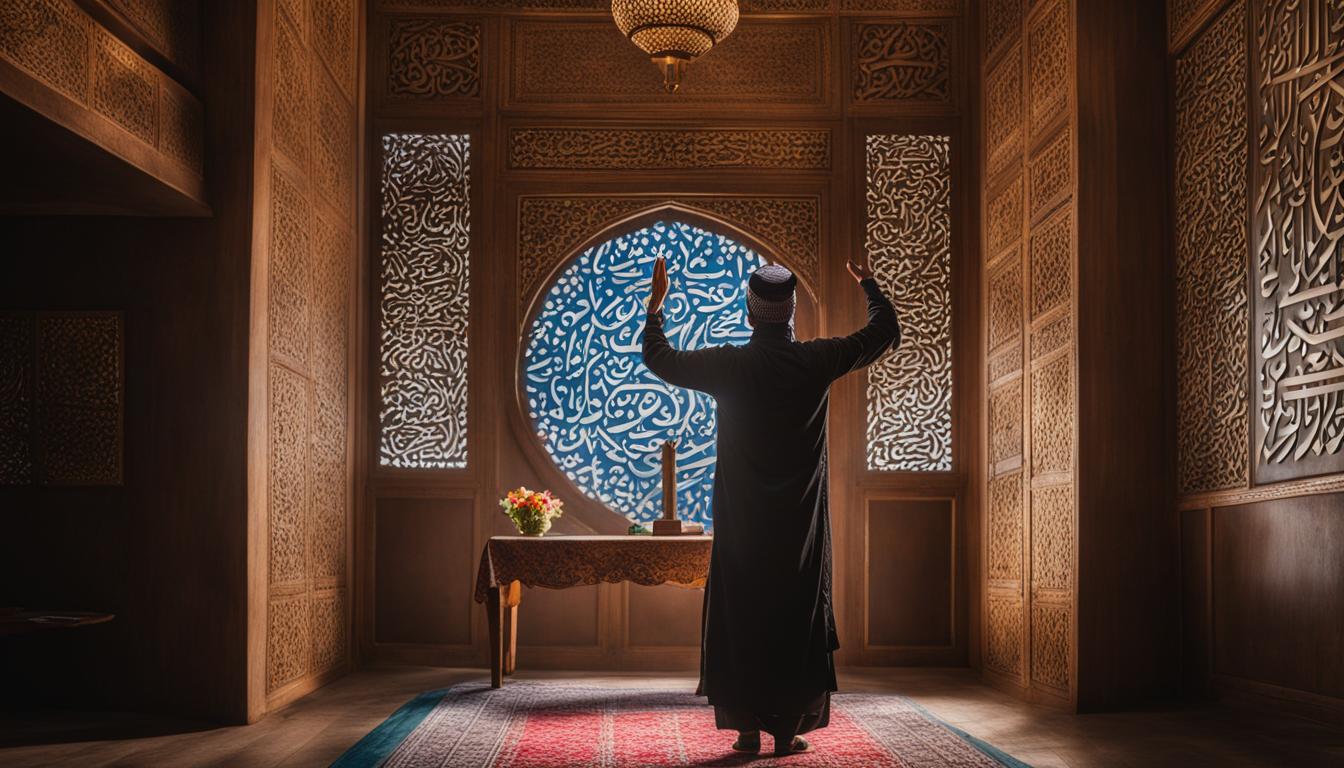The term “revert” is used to describe someone who was not born into a Muslim family but chose to embrace Islam. This term is based on the belief in Islam that all human beings are born with a natural inclination towards belief in God and the ability to discern right from wrong. While some may have reservations about the terminology, it highlights the individual’s conscious decision to convert to Islam. The choice to revert involves a personal journey of faith and an examination of one’s beliefs and cultural practices. It does not imply that those born into Muslim families have a default understanding of Islam or that they always adhere to its teachings unconditionally.
Key Takeaways:
- A revert Muslim is someone who chooses to embrace Islam, despite not being born into a Muslim family.
- The term “revert” highlights the conscious decision and personal journey of faith involved in converting to Islam.
- Not all individuals born into Muslim families have a default understanding of Islam or adhere to its teachings unconditionally.
- The choice to revert to Islam involves an examination of one’s beliefs and cultural practices.
- Islam recognizes that all human beings are born with a natural inclination towards belief in God and the ability to discern right from wrong.
Stay tuned for the next section where we explore the transformative journey of converted Muslims and the challenges they face.
The Transformative Journey of Converted Muslims
The conversion to Islam is often a profound and transformative experience for individuals. It involves a shift in understanding oneself and the world, discovering the true purpose and meaning of life through the guidance of Allah in the Quran. Converted Muslims may face challenges such as social pressure, familial resistance, and navigating a new culture and community. However, their commitment to Islam and their unwavering faith drive them to overcome these obstacles. Through their stories, we can gain a deeper understanding of the power of Islam to transform lives and provide inner peace.
Struggles and Lessons
The journey of becoming a Muslim is not without its struggles. Converted Muslims may encounter resistance from their families, friends, and society due to their decision. They may also face misunderstandings and stereotypes about Islam that they have to address. However, it is through these challenges that they learn valuable lessons about resilience, determination, and the importance of educating others about their faith. Their experiences shed light on the strength of their convictions and their unwavering commitment to their newfound faith.
Finding Inner Peace and Faith
Amidst the struggles, the journey of conversion provides a sense of inner peace and a deepening of faith. Embracing Islam allows individuals to find solace in the teachings of the Quran and the guidance of Allah. It offers a framework for living a life filled with purpose, values, and moral principles. Through prayer and contemplation, converted Muslims develop a profound connection with their Creator, strengthening their faith and finding peace in their hearts.
- Struggles
- Lessons
- Inner peace
- Faith
The Importance of Religion for Human Beings
Religion holds immense significance in human culture and society. It provides individuals with a sense of purpose, moral guidance, and a framework for understanding the world. Through its beliefs, practices, and values, religion shapes one’s relationship with a higher power and guides ethical behavior.
One of the crucial aspects of religion is its ability to offer a sense of community and support. Being part of a religious community allows individuals to connect with like-minded people, share their beliefs, and find comfort in times of stress or adversity. This sense of belonging helps individuals cope with the pressures of life and provides them with inspiration and motivation for personal growth.
The Role of Religion in Coping with Stress
Religion plays a vital role in helping people cope with stress. It offers solace and comfort, allowing individuals to turn to a higher power for guidance and support during difficult times. The rituals and practices associated with religion provide structure and can serve as a source of stability and inner peace.
In addition to addressing personal challenges, religion also plays a significant role in shaping societal values and promoting social cohesion. Many religious teachings emphasize compassion, kindness, and justice, thereby promoting ethical behavior and fostering a sense of responsibility towards others.
The Inspiration and Motivation of Religion
Religion serves as a wellspring of inspiration and motivation for individuals. It offers stories, teachings, and scriptures that provide guidance and encouragement to strive for personal and spiritual growth. These narratives often contain lessons that people can apply to their lives, inspiring them to live a life of purpose and meaning.
While religion can be a positive force, it is important to promote an inclusive approach that respects the beliefs and practices of all people. Differences in religious perspectives should be celebrated, fostering an environment of understanding and harmony. By embracing the importance of religion in our lives, we can cultivate a greater sense of compassion, strengthen our communities, and find inner peace.
The Reasons Behind Converting to Islam
People choose to convert to Islam for a variety of personal and societal reasons. The decision to convert religions is often deeply rooted in an individual’s personal beliefs and spiritual journey. Many individuals find that Islam aligns better with their personal values and provides them with a sense of spiritual fulfillment. The teachings of Islam, such as compassion, social justice, and the importance of community, resonates with their inner beliefs and offers a framework for living a meaningful life.
The influence of family and friends can also play a significant role in one’s decision to convert to Islam. Seeing the positive impact of Islam on their loved ones may inspire individuals to explore the faith further and ultimately embrace it. Additionally, marrying into a different religion can lead individuals to consider converting to Islam, as they seek unity and harmony within their relationships.
- Personal beliefs and spiritual fulfillment
- Influence of family and friends
- Marrying into a different religion
- Political and social reasons
- Personal experiences
Political and social factors can also motivate individuals to convert to Islam. In some cases, people may see Islam as a means of expressing their resistance to perceived injustices or as a way to align themselves with a particular community or cause. Personal experiences, such as encountering the kindness and generosity of Muslims or witnessing the positive impact of Islamic teachings, can also be influential factors in one’s decision to convert.
The reasons behind converting to Islam are diverse and unique to each individual. It is a deeply personal journey that involves introspection, exploration, and a search for spiritual truth. Understanding these reasons can offer valuable insights into the dynamics of religious conversion and provide a deeper appreciation for the choices made by those who embrace Islam.

Factors driving Islam’s growth:
- High birth rates in Muslim-majority countries
- Migration to different regions
As Islam continues to grow, it reflects the appeal and relevance of its teachings in a rapidly changing world. The increasing number of people choosing Islam as their faith signifies the positive impact it has on individuals and societies, providing spiritual guidance, a sense of community, and a moral framework for living.
Conclusion
In conclusion, the concept of a “revert Muslim” provides insight into the conversion process and the conscious decision made by individuals to embrace Islam. The journey of faith for converted Muslims is often transformative, encompassing challenges, lessons, and ultimately finding inner peace through their commitment to Islam.
Religion, including Islam, plays a vital role in human life, offering a sense of purpose, moral guidance, and inspiration. It serves as a framework for understanding the world and provides individuals with a set of beliefs, practices, and values to shape their relationship with a higher power.
The reasons for converting to Islam are diverse and personal, driven by individual beliefs, experiences, and socio-cultural factors. Whether it’s a spiritual fulfillment, influence from family and friends, or personal and political events, every journey to Islam is unique and multifaceted.
The rapid growth of Islam globally highlights its relevance and appeal in today’s world. With the increasing number of people choosing Islam as their faith, it is evident that its teachings resonate with many, and its impact continues to shape lives and communities.
FAQ
What does it mean to be a “revert Muslim”?
A “revert Muslim” is someone who was not born into a Muslim family but chose to embrace Islam. It highlights the individual’s conscious decision to convert to Islam.
What is the conversion process like for those who choose Islam?
The conversion to Islam is often a profound and transformative experience. It involves a shift in understanding oneself and the world, discovering the true purpose and meaning of life through the guidance of Allah in the Quran.
What challenges do converted Muslims face?
Converted Muslims may face challenges such as social pressure, familial resistance, and navigating a new culture and community. However, their commitment to Islam and their unwavering faith drive them to overcome these obstacles.
What role does religion play in human life?
Religion plays a significant role in human culture and society, providing individuals with a sense of purpose, moral guidance, and a framework for understanding the world. It offers a set of beliefs, practices, and values that shape one’s relationship with a higher power and guide ethical behavior.
Why do people choose to convert to Islam?
People choose to convert to Islam for various personal and societal reasons. Some individuals find that their personal beliefs and values align better with Islam, offering them spiritual fulfillment. Others are influenced by family and friends who are Muslim or are attracted to the values and teachings of Islam, such as compassion and social justice.
Is Islam growing as a religion?
Yes, Islam is recognized as the fastest-growing major religion in the world. The Muslim population is expected to grow by 70% between 2015 and 2060, compared to an overall population growth of 32%. This growth is primarily driven by high birth rates in Muslim-majority countries and migration to other regions.

